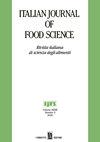Effect of different plants’ aromatic essential oils on frozen Awassi lamb meat’s chemical and physical characteristics
IF 3.3
4区 农林科学
Q2 FOOD SCIENCE & TECHNOLOGY
引用次数: 4
Abstract
The effect of drenching Awassi lambs with three aromatic essential oils from sage (Salvia officinalis L.), clove (Syzygium aromaticum L.), and laurel (Laurus nobilis L.) was investigated on meat chemical and physical characteristics, and oxidative and deterioration measurements. Twenty-four Awassi lambs, five to six months old, were divided into four groups. A concentrated diet was provided to the lambs at a rate of 3% of the body weight. The treatments were as follows: T1 was served as the untreated control, while T2, T3, and T4 were drenched with oils of sage, clove, and laurel, respectively. Drenching was carried out using water-soluble capsules containing 500 mg oil/capsule/day. Treatments lasted 90 days. At the end of the treatment period, the animals were fasted overnight and slaughtered. The carcasses were cleaned and kept at 4°C for 24 h. The longissimus dorsi (LD) muscle was then separated and preserved in a plastic bag for three preservation periods: no freezing and 30 days and 60 days freezing at −18°C. Several physical, fat, and protein stability analyses of meat were done after the preservation periods. The results indicated no significant effect of drenching Awassi lambs with different aromatic essential oils on the meat’s physical and chemical characteristics. However, these oils, especially clove oil, affected fat and protein stability with increasing preservation period by freezing.不同植物芳香精油对冷冻Awassi羊肉理化特性的影响
研究了用鼠尾草(Salvia officinalis L.)、丁香(Syzygium aromaticum L.)和月桂(Laurus nobilis L.)三种芳香精油对Awassi羔羊肉的化学和物理特性以及氧化和变质性能的影响。24只5至6个月大的Awassi羊羔被分为四组。以羔羊体重的3%的比例为其提供浓缩日粮。处理如下:T1作为未处理的对照,而T2、T3和T4分别用鼠尾草油、丁香油和月桂油浸泡。使用含有500mg油/胶囊/天的水溶性胶囊进行脱水。治疗持续90天。在治疗期结束时,将动物禁食过夜并屠宰。对尸体进行清洁,并在4°C下保存24小时。然后分离背最长肌(LD),并在塑料袋中保存三个保存期:不冷冻,在−18°C下冷冻30天和60天。在保存期结束后,对肉进行了一些物理、脂肪和蛋白质稳定性分析。结果表明,不同芳香精油对Awassi羔羊肉的理化特性没有显著影响。然而,随着冷冻保存期的延长,这些油,尤其是丁香油,会影响脂肪和蛋白质的稳定性。
本文章由计算机程序翻译,如有差异,请以英文原文为准。
求助全文
约1分钟内获得全文
求助全文
来源期刊

Italian Journal of Food Science
工程技术-食品科技
CiteScore
4.20
自引率
0.00%
发文量
33
审稿时长
>36 weeks
期刊介绍:
"Italian Journal of Food Science" is an international journal publishing original, basic and applied papers, reviews, short communications, surveys and opinions on food science and technology with specific reference to the Mediterranean Region. Its expanded scope includes food production, food engineering, food management, food quality, shelf-life, consumer acceptance of foodstuffs, food safety and nutrition, energy and environmental aspects of food processing on the whole life cycle.
Reviews and surveys on specific topics relevant to the advance of the Mediterranean food industry are particularly welcome.
 求助内容:
求助内容: 应助结果提醒方式:
应助结果提醒方式:


